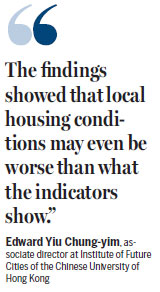Housing conditions poorer as rents keep rising
Updated: 2015-06-26 07:26
By Luis Liu in Hong Kong(HK Edition)
|
|||||||
Hong Kong's housing conditions have deteriorated in recent years as low-income tenants in subdivided flats have to use a bigger proportion of their income to pay rent while living in smaller flats, according to a study by the Chinese University of Hong Kong.
The university's Institute of Future Cities (IOFC) interviewed 66 households living in subdivided flats in seven districts earlier this year and found that the average rent-to-income ratio for subdivided-flat tenants stood at 41 percent - up from 29 percent from a similar study commissioned by the government in 2013. The figure is also 15 percentage points higher than the city's official average in the latest census.
The surveyed households' average monthly income was about HK$10,000, but more than HK$4,000 was used to pay rent, and they are living in smaller units.
It was found that the average area per capita dropped from 67.6 square feet in 2013 to 47.8 square feet this year. Both figures were below Hong Kong's minimum standard of 70 square feet in public housing.
Researchers suggested that the current official calculation method, in which the city's medium income is divided by the medium rent, may not reflect reality as low-income households have to cramp into smaller flats to achieve the affordability level.
If the per capita living area is adjusted to the 2013 level, the rent-to-income ratio would be as high as 72.6 percent, according to the report.
IOFC Associate Director Edward Yiu Chung-yim said the findings showed that local housing conditions may even be worse than what the indicators show.
The trend can also be observed from changes in rents and incomes. In the past three years, the SAR's medium rents had risen by 31 percent, while medium incomes have gone up by just 15 percent, according to the Census and Statistics Department.
Yiu believed that the study would provide more accurate statistics for the government's future policies on issues relating to subdivided flats.
He urged the government to take more proactive measures to improve the living conditions of those in the low-income group.
In the short term, the government should regularize the Community Care Fund's subsidies for low-income households which are not included in any of the city's public housing programs.
In the long run, the government needs to build more public rental housing in urban areas and source land from the Urban Renewal Authority (URA) and old housing estates, Yiu said.
Local concern groups welcomed the findings which, they said, "reflect reality".
Lai Kin-kwok, convener of the Platform Concerning Subdivided Flats and Relevant Issues, said the issue of subdivided housing is pressing, adding that increasing the supply of transitional housing is urgent.
He advised the government to make use of some 700 vacant flats under the control of the URA and various government departments. Non-governmental organizations could also be encouraged to join the project.
Hong Kong has long been high on the list of the world's least affordable housing cities.
A study of 378 metropolitan areas in nine countries earlier this year found that Hong Kong, Vancouver and Sydney were the most unaffordable housing markets among the cities polled.
The SAR's median home prices were 17 times the median pre-tax household income in 2014 - the least affordable recorded in 11 years - according to the Demographia International Housing Affordability Survey.
luisliu@chinadailyhk.com

(HK Edition 06/26/2015 page8)